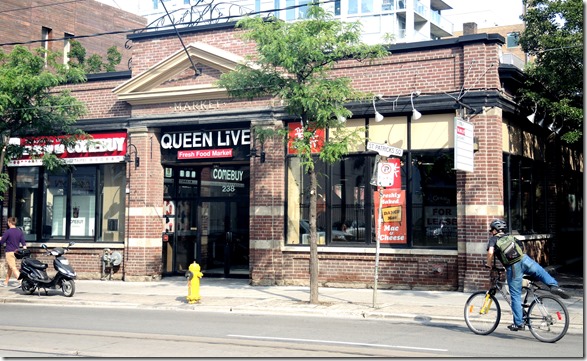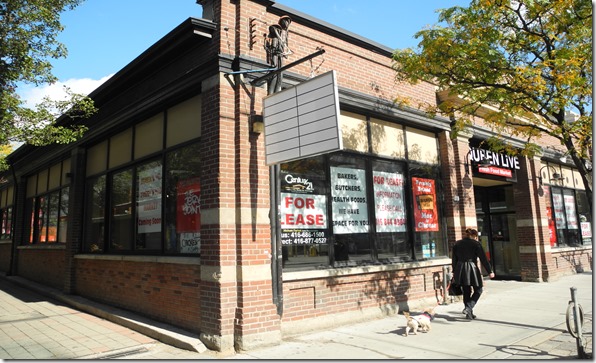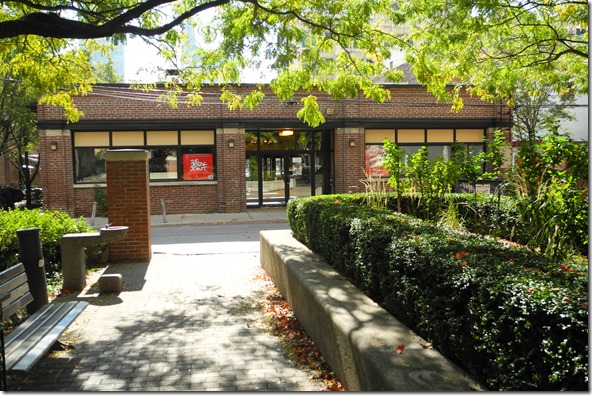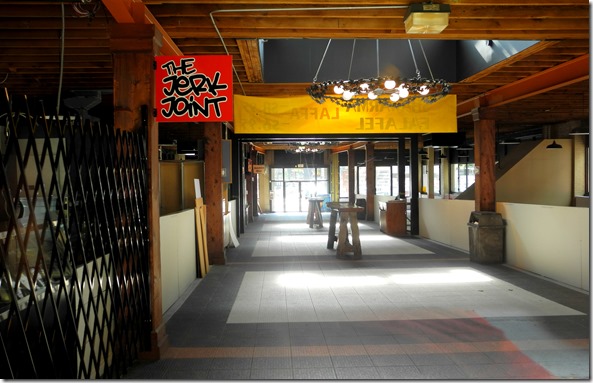238 Queen Street West, the site of the old St Patrick’s Market—now the Queen Street Market
In 1836, Mr. D’Arcy Boulton (1785-1846), who resided at the Grange (now part of the AGO), donated land on Queen Street to the city on condition that it provide a site for a public market, open to everyone in perpetuity. The market square was to extend 123 feet back from Queen Street, as far as the laneway behind Queen Street. It was Toronto’s second market, after the St. Lawrence Market, which had opened 29 years earlier. The property that D’Arcy Boulton donated had originally been a part of the hundred acre, “Park Lot #13,” bounded by Queen Street, McCaul, Dundas, and Beverley. The new market was to be named St. Patrick’s Market as it was in St. Patrick’s Ward.
The city erected a frame building to protect shoppers from the elements, and farmers brought their produce to the stalls inside the structure. Eventually they replaced it with a modest brick building, completed in 1856. Three prominent citizens provided the funds for the structure, on condition that they would be reimbursed from the profits of the market. The Toronto Directories list four butchers as having stalls in the building in 1861. The market never became as important as the St. Lawrence or St. Andrew’s Market, but it was important to those who resided within walking distance of its stalls. The brick building completed in 1856 was destroyed by fire.
The present-day building on the site at Queen Street West dates from 1912, so is historic in its own right, since it is over a hundred years old. It was designated a Heritage site in 1975. It was renovated and modernized several years ago, and a few of the spaces inside the building are now occupied by new tenants. The market is located across from the Bell Media Building on the southeast corner of John and Queen, amidst the ever-busy and vibrant Queen Street West,
This watercolour from the collection of the Toronto Reference Library is puzzling. It is dated 1912. However, the St. Patrick’s Market that is depicted is not the 1912 market building and appears too grand to be the one that was pre-1912. However, the watercolour accurately depicts the Anglican Church of St. George the Martyr, located behind the building. This is the church that has lost its spire in a fire in 1956. The only other market building on this site was a frame structure, which this does not appear to be the one in this painting.![pictures-r-5354[1] pictures-r-5354[1]](https://tayloronhistory.com/wp-content/uploads/2013/10/pictures-r-53541_thumb.jpg)
This 1890 photo from the City of Toronto Archives shows that St. Patrick’s Market building that was constructed in 1856. The architect is unknown, but it is a rather a grand structure for its size. It was destroyed by fire and replaced in 1912 with the building that remains on the site today. It is odd that the spire of St. George the Martyr is not visible in this photo, as the the year the photo was taken the tower had not lost the spire.
This photo from the City of Toronto Archives is from the 1980s, when the market was usually referred to by many people as “the chicken market.” In the photo, there are no windows on the right-hand side of the building.
The market building in 2013.
The rear view (north facade) of the market, from St. Patrick’s Square.
Interior of the market building in August of 2013. Its skylights and large wooden beams create an attractive atmosphere.
To view the Home Page for this blog: https://tayloronhistory.com/
To view other posts about the history of Toronto and its buildings:
The Brooke Building at Front St. East and Jarvis St.
The lighthouse on Gibraltar Point on Centre Island
https://tayloronhistory.com/2013/08/20/torontos-architectural-gemsthe-toronto-island-lighthouse/
The old church at College and Elizabeth Streets, now occupied by the U of T
The Ellis Building on Adelaide Street near Spadina Ave.
The Heintzman Building on Yonge Street, next to the Elgin Theatre
The tall narrow building at 242 Yonge Street, south of Dundas
https://tayloronhistory.com/2013/07/10/torontos-architectural-gems242-yonge-st-south-of-dundas/
Toronto’s first Reference Library at College and St. George Streets.
The Commodore Building at 315-317 Adelaide St. West
The Graphic Arts Building (condo) on Richmond Street
The Art Deco Victory Building on Richmond Street
The Concourse Building on Adelaide Street
The old Bank of Commerce at 197 Yonge Street
The Traders Bank on Yonge Street—the city’s second skyscraper
https://tayloronhistory.com/2013/05/22/torontos-architectural-gemstraders-bank-on-yonge-st/
Toronto’s old Union Station on Front Street, built in 1884
https://tayloronhistory.com/2013/05/18/torontos-lost-architectural-gemsthe-old-union-station/
St. Andrew’s Presbyterian Church at King and Simcoe Streets.
https://tayloronhistory.com/2013/05/13/torontos-architectural-gemshistoric-st-andrews-on-king-st/
The row houses on Glasgow Street, near Spadina and College Streets
https://tayloronhistory.com/2013/05/10/torontos-architectural-gemsrow-houses-on-glasgow-st/
The bank at Queen and Simcoe that resembles a Greek temple
The cenotaph at Toronto’s Old City Hall
https://tayloronhistory.com/2013/04/09/torontos-architectural-gemscenotaph-at-old-city-hall/
The magnificent Metropolitan Cathedral at King East and Church Streets
https://tayloronhistory.com/2013/04/02/torontos-architectural-gemsmetropolitan-cathedral/
St. Stanislaus Koska RC Church on Denison Avenue, north of Queen West
The historical St. Mary’s Church at Adelaide and Bathurst Streets
The Bishop’s (St, Michael’s) Palace on Church Street, Toronto
https://tayloronhistory.com/2013/03/02/torontos-architectural-gemsbishops-palace-on-church-street/
The Union Building at Simcoe and King Street West
https://tayloronhistory.com/2013/03/30/torontos-architectural-gemsthe-union-building-on-king-st/
The Ed Mirvish (Pantages, Imperial, Canon) Theatre, a true architectural gem on Toronto’s Yonge Street
The Waverly Hotel on Spadina near College Street.
https://tayloronhistory.com/2013/02/16/toronto-architectural-gemsthe-waverly-hotel-484-spadina/
The Art Deco Bank of Commerce building on King Street West.
The Postal Delivery Building, now the Air Canada Centre (ACC)
The Bellevue Fire Station on College Street
https://tayloronhistory.com/2013/02/14/torontos-architectural-gems-bellevue-fire-station/
The Bank of Nova Scotia at King and Bay Streets
Toronto’s old Sunnyside Beach
https://tayloronhistory.com/2013/02/01/a-pictorial-journey-to-sunnyside-beach-of-old-part-one/
https://tayloronhistory.com/2013/02/03/a-pictorial-journey-to-torontos-old-sunnyside-beach-part-two/
Toronto’s architectural gems—the Runnymede Library
https://tayloronhistory.com/2013/02/05/torontos-architectural-gems-runnymede-library/
Spadina Avenue – sinful, spicy and diverse
https://tayloronhistory.com/2012/09/28/sinfully-saucy-and-diversetorontos-spadina-avenue/
The Reading Building, a warehouse loft on Spadina Avenue
https://tayloronhistory.com/2013/01/20/torontos-architectural-gemsthe-reading-building-on-spadina/
The Darling Building on Spadina Avenue
https://tayloronhistory.com/2013/01/19/torontos-architectural-gemsthe-darling-building-on-spadina/
The amazing Fashion Building on Spadina Avenue
Toronto’s architectural gems – the Tower Building at Spadina and Adelaide Street
The Balfour Building at 119 Spadina Avenue
The Robertson Building at 215 Spadina that houses the Dark Horse Espresso Bar
An architectural gem – Grossman’s Tavern at Spadina and Cecil Streets
https://tayloronhistory.com/2012/11/08/architectural-gem-grossmans-tavern-at-377-9-spadina/Historic
History of the house that contains the Paul Magder Fur Shop at 202 Spadina
An important historic building that disappeared from the northeast corner of Spadina and College
Historic bank building on northeast corner of Spadina and Queen West
https://tayloronhistory.com/2012/12/02/torontos-architectural-gemsbank-at-spadina-and-queen-west/
History of the Backpackers’ Hotel at King and Spadina
https://tayloronhistory.com/2012/03/31/history-of-the-backpackers-hotel-at-king-and-spadina/
Hamburger corner – Spadina and Queen Streets
https://tayloronhistory.com/2012/10/10/torontos-hamburger-cornerwhere-is-it-and-why/
Lord Lansdowne Public School on Spadina Crescent
The Victory Burlesque Theatre at Dundas and Spadina
https://tayloronhistory.com/2012/09/08/the-sinful-victory-burlesque-theatre-at-dundas-and-spadina/
The Dragon City Mall on the southwest corner of Dundas and Spadina
https://tayloronhistory.com/2012/08/25/torontos-heritage-the-southwest-corner-of-queen-and-spadina/
Buildings on the west side of Spadina a short distance north of Queen Street.
History of the site of the Mcdonalds on northwest corner of Queen and Spadina
https://tayloronhistory.com/2012/08/27/mcdonalds-at-queen-and-spadina-on-an-historic-site/
A former mansion at 235 Spadina that is now almost hidden from view.
ttps://tayloronhistory.wordpress.com/2012/07/04/torontos-architectural-gems-is-this-one-a-joke/
Military hero of the War of 1812 lived near corner of Spadina and Queen West.
The Art Deco bus terminal at Bay and Dundas Streets.
Photos of the surroundings of the CN Tower and and the St. Lawrence Market in 1977
The old Dominion Bank Building at King and Yonge Street
The Canada Life Building on University and Queen Street West.
Campbell House at the corner of Queen Street West and University Avenue
A study of Osgoode Hall
https://tayloronhistory.com/2012/04/12/enjoying-torontos-architectural-gems-osgoode-hall/
Toronto’s first City Hall, now a part of the St. Lawrence Market
Toronto’s Draper Street, a time-tunnel into the 19th century
The Black Bull Tavern at Queen and Soho Streets, established in 1822
History of the 1867 fence around Osgoode Hall on Queen Street West at York Street
Gathering around the radio as a child in the 1940s
The opening of the University Theatre on Bloor Street, west of Bay St.
https://tayloronhistory.com/2012/02/24/the-opening-of-torontos-university-theatre-on-bloor-street/
122 persons perish in the Noronic Disaster on Toronto’s waterfront in 1949
Historic Victoria Memorial Square where Toronto’s first cemetery was located, now hidden amid the Entertainment District
https://tayloronhistory.com/2012/01/09/victoria-square-in-torontos-entertainment-district-is-a-gem/
Visiting one of Toronto’s best preserved 19th-century streets-Willcocks Avenue
The 1930s Water Maintenance Building on Brant Street, north of St. Andrew’s Park
Toronto’s architectural gems-photos of the Old City from a book published by the city in 1912
Toronto’s architectural gems in 1912
https://tayloronhistory.com/2012/12/04/torontos-architectural-gems-in-1912/
Toronto’s architectural gems – the bank on the northeast corner of Queen West and Spadina
https://tayloronhistory.com/2012/12/02/torontos-architectural-gemsbank-at-spadina-and-queen-west/
Photos of the surroundings of the CN Tower and and the St. Lawrence Market in 1977
The St. Lawrence Hall on King Street
https://tayloronhistory.com/2012/04/28/enjoying-torontos-architectural-gems-the-st-lawrence-hall/
Toronto’s streetcars through the past decades
https://tayloronhistory.com/2012/03/26/memories-of-torontos-streetcars-of-yesteryear/
History of Trinity Bellwoods Park
https://tayloronhistory.com/2012/04/09/the-history-and-beauty-of-trinity-bellwood-park/
A history of Toronto’s famous ferry boats to the Toronto Islands

![pictures-r-5352[1] pictures-r-5352[1]](https://tayloronhistory.com/wp-content/uploads/2013/10/pictures-r-53521_thumb.jpg)
![f0124_fl0002_id0131[1] f0124_fl0002_id0131[1]](https://tayloronhistory.com/wp-content/uploads/2013/10/f0124_fl0002_id01311_thumb.jpg)


